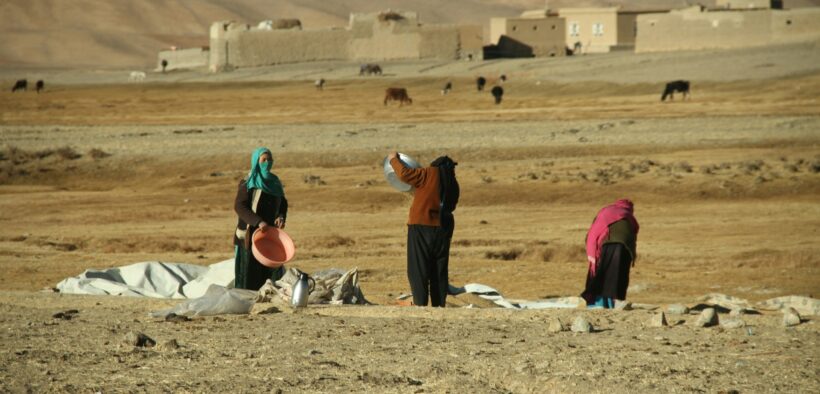International Law’s Protection of Women’s Rights: Navigating the New Extremes of Global Conflicts
Share

Image Credits: @thefaridershad on Unsplash (Unsplash License)
While the frequency of large-scale global wars has decreased, the mutating nature of conflict has ushered in a new era replete with violent and internationalized internal conflict. State-based crises are exacerbated by the increasing prevalence of non-state armed groups, climate shocks, economic turmoil, security threats, escalated violence, and technological advancements. Most notably, amid these new extremes, international law is failing to mitigate crises and hold perpetrators accountable. Women disproportionately bear the burden of conflicts, and their current international legal protections prove insufficient in the face of the new extremes of global conflicts.
Current International Legal Protections of Women’s Rights
Women face a multitude of risks during modern conflict, including sexual and gender-based violence, displacement, and restricted rights. Women’s equality is often forgotten and overlooked during times of conflict because of the pervasiveness of discriminatory ideas, structural inequalities, and social and cultural norms. While there are international conventions and treaties in place to protect women during conflicts, implementation remains inconsistent—many countries are failing to uphold their obligation to enforce provisions demanding equality, anti-discrimination, and nonviolence effectively.
Most international human rights treaties have provisions asserting the equality of men and women. The International Bill of Human Rights, composed of the legally binding International Covenant on Economic, Social and Cultural Rights and the International Covenant on Civil and Political Rights, asserts women’s equality and guarantees a plethora of protections. The Geneva Conventions and its protocols govern international humanitarian law, and they have specific protections for women during conflict. Europe, Africa, the Inter-American system, and the Arab states each have a regional human rights charter that includes women. Additionally, Articles 7 and 8 of the International Criminal Court’s (ICC) Rome Statute classify grave forms of sexual violence as a crime against humanity and a war crime.
The United Nations Convention on the Elimination of all Forms of Discrimination Against Women (CEDAW) is often described as the international bill of rights for women. Composed of thirty articles, the Convention condemns discrimination and stipulates that state parties guarantee equal political, social, economic, and civil status for women. It is the only human rights treaty to affirm the reproductive rights of women and provide safeguards against violence stemming from antiquated cultural and traditional practices.
None of CEDAW’s articles directly dictates state obligations to protect women during conflict. Rather, states are expected to always uphold the treaty’s protections. Some of the articles do address crimes against women that are common within modern conflict. For example, Article 6 requires states to suppress all forms of trafficking and exploitation of women. Additionally, some states have submitted reservations to certain provisions of CEDAW. Reservations are statements where state parties modify or exclude the legal effects of a certain treaty. Middle Eastern states in particular pledge to uphold CEDAW so far as it does not interfere with their religion. However, all states, including reserving states, have a continuous obligation to advance toward full equality.
Despite these legal protections, women’s rights are not guaranteed in practice, especially in conflicts. The International Rescue Commission (IRC) publishes an annual report assessing the twenty states at greatest risk for new or continued humanitarian crises within their conflicts. Additionally, the Georgetown Institute for Women, Peace and Security (GIWPS) produces an index ranking countries regarding women’s inclusion, justice, and security. A cross-analysis of the studies reveals that the conflicts in Afghanistan, the Democratic Republic of Congo (DRC), South Sudan, and Syria have produced some of the worst conditions for women’s rights in the world. South Sudan is not a signatory to the ICC, meaning that the country cannot be criminally charged for violating its statute. Additionally, while Afghanistan, the DRC, South Sudan, and Syria have ratified CEDAW, they still violate their international obligations. As conflicts increase in intensity and proliferation, with women often caught in the middle, states undermine international law without any consequences.
The Failure of Women’s Rights Protections in Ongoing Conflicts
Afghanistan: Not only does GIWPS rank Afghanistan as the country with the worst women’s rights outcomes, but other entities have also begun to dub it a “gender apartheid.” Since seizing control in August 2021, the Taliban has stripped women of the basic rights protecting their autonomy and safety. According to GIWPS’s report, the Taliban carried out revenge killings, forced the disappearances of women activists, banned women aid workers, closed shelters for survivors, released convicted domestic abusers, removed female justices from their positions, and blocked women from addressing claims of violence, among many other discriminatory and unjust actions. The country itself is burdened by economic issues and climate shocks, and most women live in close proximity to active armed conflict. Many organizations, including Amnesty International, Human Rights Watch, and the International Commission of Jurists, have stated that an investigation into the Taliban for potential crimes against humanity. In 2022, the ICC resumed its investigations in Afghanistan for war crimes and crimes against humanity. There has yet to be any progress—ICC investigations often take years. As the Taliban remains unpunished, the ICC’s investigation represents one of the only routes to end the Talbian’s gender apartheid.
Democratic Republic of Congo (DRC): Decades of protracted conflict between armed groups in the DRC have resulted in countless human rights violations and widespread gender-based violence. The IRC ranked the conflict as #10 on its Watchlist for 2024, ranking it as home to one of the worst humanitarian crises in the world. A recent resurgence of violence has driven insecurity to new heights, and its continued escalation is expected to further harm Congolese citizens, particularly women. GIWPS ranked the DRC as the fourth lowest state in terms of inclusion, security, and justice. The organization cites that soldiers and members of non-state armed forces have committed many heinous crimes of sexual violence, including sexual torture. According to UN Women, up to 52% of Congolese women are survivors of domestic violence and 27% are victims of harmful traditional practices. Despite domestic, regional, and international legal protections, Congolese women have spent decades subjected to disproportionately high rates of violence and inequality.
South Sudan: South Sudan became one of the newest states in the international arena after gaining independence from Sudan in 2011. Since its conception, the state has faced persistent instability from civil wars, conflicts, climate shocks, hunger, and spillover effects from the war in Sudan. It is ranked as #3 on IRC’s watchlist for 2024. South Sudan also has some of the highest rates of gender-based violence in the world. The GIWPS ranks the country as the 5th lowest, reporting that rebel forces committed 131 documented rapes across 28 villages in 2022. Many more likely went unreported. According to the UN Commission, the Sudanese military instrumentalizes sexual violence as a reward and entitlement for men who participate in the conflict. Women bear the brunt of the state’s deprivation, reduced to a tool in a man’s world. Despite the state’s steps towards joining international treaties protecting women’s rights, its attempts remain inadequate given the extent and scale of violence against Sudanese women.
Syria: Since initial protests against the Syrian regime began in 2011, Syria has become a battleground for government forces, non-state armed forces, and international forces. Persistent droughts, food insecurities, economic shortfalls, and climate changes further exacerbate the internationalized conflict. Syria is on the Watchlist, but the IRC does not expect a major escalation of conflict. GIWPS, ranking Syria the 7th worst on its report, explains that while there are fewer battle-related deaths of women, most women live in proximity to conflict. Syrian women are curbed by discrimination and inequalities throughout civil society’s practices, norms, and laws. Additionally, gender-based violence and sexual exploitation and abuse are prevalent, and women are often killed or disappeared. The government has made limited progress in advancing women’s rights, but the measures and reforms outlined in CEDAW and other international treaties remain largely unimplemented.
Conclusion: The Future of International Law and Women’s Rights in Conflicts
The impact of conflicts around the world is exacerbated by increases in non-state armed groups, security threats, climate crises, economic turmoil, advancing technology, and violence. At the center of it all, women bear the brunt of the conflict as states fail to prioritize non-discrimination and equality. International legal protections for women exist in a variety of forms, but states do not uphold or implement them to the standard required, especially in those with ongoing conflicts.
It is one thing for a state to have protections in place, but it is another to actively enforce them. International law needs methods of accountability that will penalize states for failing to enforce the women’s rights treaties that they are legally bound to. Syria, Afghanistan, South Sudan, and the DRC have all ratified CEDAW, yet their internal conflicts have produced some of the worst women’s rights outcomes in the world. These states award perpetrators with impunity rather than accountability. Moreover, while some of the states hold reservations to CEDAW, they are still obligated to advance towards full equality.
International organizations often make recommendations and offer assistance to governments that fail to uphold their legal obligation to protect women’s rights. For example, the UN’s Committee Against Torture urged Syria to amend its criminal legislation in compliance with the Convention Against Torture, which criminalizes marital rape and domestic violence. The recommendations remain largely unimplemented. Governments must start taking active steps toward implementing protective measures and holding perpetrators accountable, and they can begin by following the recommendations of international organizations. It is not enough to simply ratify a treaty—the rights of women must be prioritized, especially in countries experiencing conflict.
Failure to abide by international law’s protection of women’s rights creates a precedent and justification for states to disregard other legal obligations of international law. As conflicts increase in intensity, unpunished war crimes and crimes against humanity will become prevalent in the global arena. The failure of international law to hold states accountable could be its downfall unless international bodies take clear and authoritative steps to guarantee the enforcement of treaties. Women are the greatest victims of war, and they will continue to be disproportionately harmed by conflict unless international law is administered to its fullest extent.


Want to get involved?
Connect with us! Connect with us!